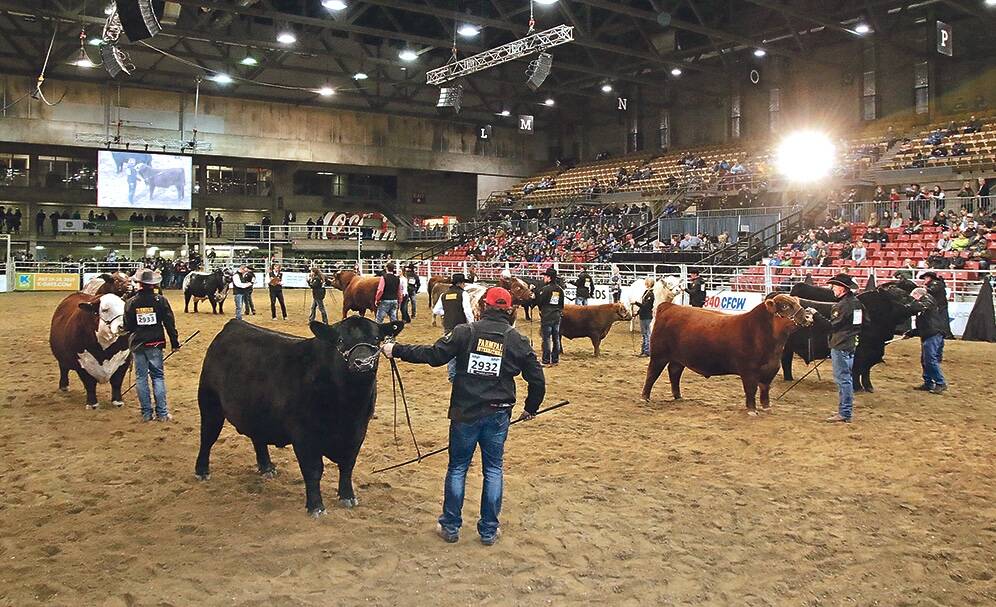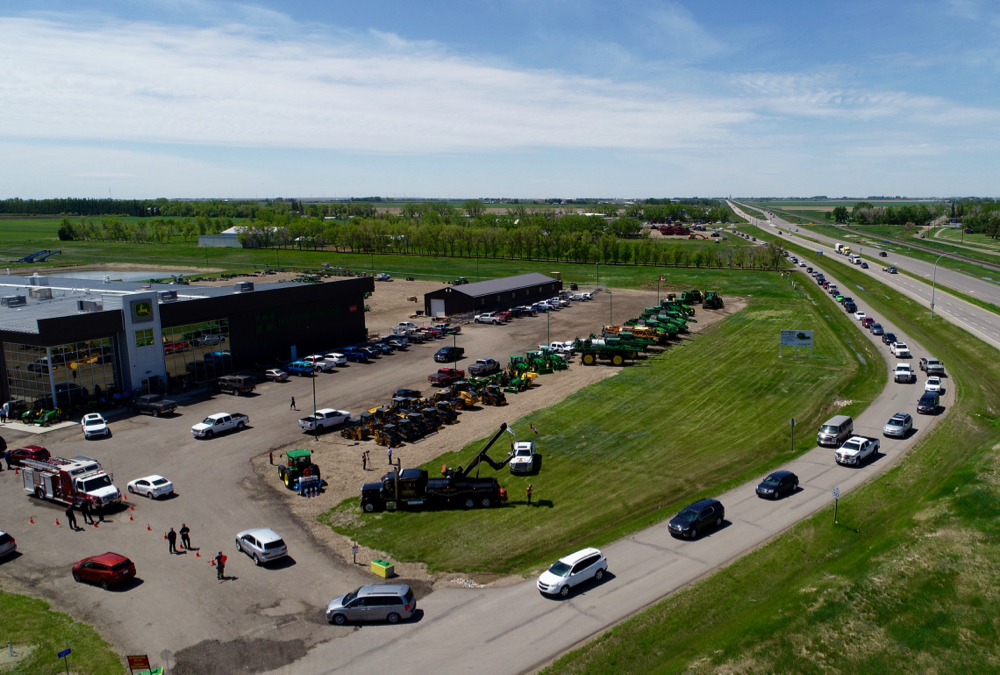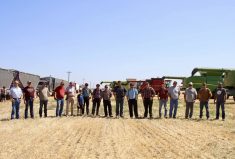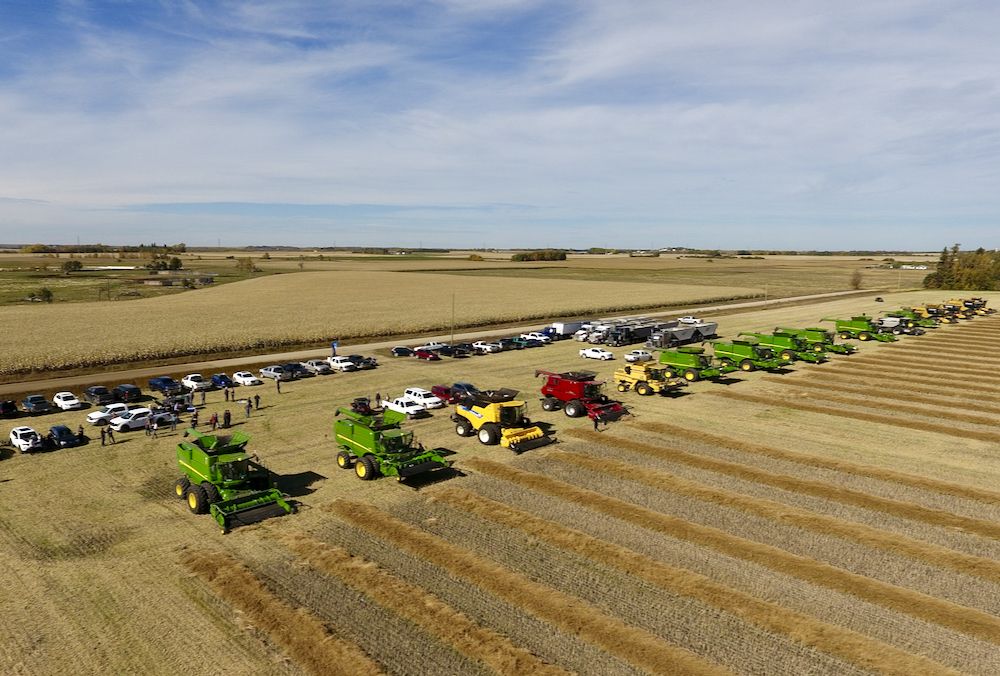They figured their fundraising goal was hugely ambitious — but boy were they wrong.
“As I pulled into the dealership at 7:30, there were cars lined up already, and we weren’t starting until 9,” said Steven Dyck, president of Western Tractor. “It was literally to the point where they were lined up down the highways. The response was just incredible.”
The idea for what was dubbed ‘Fry Day’ — giving away 7,500 bags of french fries in hopes of raising $100,000 — was born when HALO Air Ambulance sent out an email saying it was in “dire straits.” Without an immediate infusion of cash, the organization said it would be forced to scale back, or even stop its service, by July 1.
“There was the potential it could close its doors after 13 years of supporting southern Alberta’s skies,” said Dyck, a longtime supporter of the only medevac helicopter service dedicated to southern Alberta.

HALO, of course, wasn’t the only operation struggling during the pandemic and Dyck immediately thought of potato growers in the region, who have been hit hard by the plummeting sales of french fries.
“With restaurants shuttering, consumption went dramatically down, and that had a significant financial impact on them,” said Dyck.
“Southern Alberta’s potato industry is very important to us as a contributor to the agricultural landscape, so we wanted to bring some awareness in a way that would encourage the general public to start consuming more.
“So we said, ‘OK, how can we put helicopters and potatoes together and do something about this?’”
Dyck brought McCain Foods and J.E.B. Transport in Taber on board, and in less than two weeks, the Fry Day fundraiser was organized. The May 29 event was held at Western Tractor dealerships in Taber, Medicine Hat, Burdett, and Lethbridge. The hope was that the giveaway of 7,500 bags of McCain fries would not only draw a crowd, but spur folks to open their wallets.
Read Also

Farmfair International boosts accessibility with weekend schedule shift
Farmfair International is changing its scheduling format to include the weekend and hopefully attract even more attendees.
The lineup of vehicles — upwards of 3,000 people showed up — was a surprise, but even more so was their generosity and that of others.
“We set a goal of $100,000, and we’re north of $350,000 right now — and that’s continuing to climb. We’re over the moon,” said Dyck.
“There were families pulling up with kids emptying money out of their piggybanks to put in the bucket for HALO. That was pretty powerful.”
The agriculture community came out “in a big way” to support the event, he added.
A group of 29 Hutterite colonies came together to present a cheque of more than $60,000 to the cause, while other businesses and individual growers added their own sizable donations to the pot.

“It took one potato producer to put $10,000 on the table and challenge the rest of them, and it started to snowball from there,” he said.
“We had already reached our goal by that day, but what we saw happen that day really lit us up. It made us pretty proud of what we were part of.”
Jeremy Carter, senior field manager at McCain Foods in southern Alberta, was “blown away” by the support.
“There was no hesitation to get behind the cause,” said Carter. “We set a target we thought was ambitious at $100,000, and the community blew it out of the park. The support for HALO was just phenomenal.”
For McCain Foods, it was a no-brainer to get involved in the event, he added.
“We work closely with 30 family farms here in Alberta, and each and every one of them has seen the impact of COVID on their operations,” said Carter.
“We really want to see a sustainable industry beyond COVID, and this is one way of raising awareness among the general public that our grower community is important to us.
“It’s really important to us as a family business working with family businesses that we support one another, and this was a great way to do that.”
And for HALO, the community support has done the almost impossible at a time when charitable donations are down by as much as $10 billion across the country.

The funding has bought the organization enough time — and exposure — to approach municipal and provincial governments for a more sustainable source of funding going forward.
“Even though it’s worked for it for the last 13 years, it’s been living off of very meagre fundraising revenue to support this work,” said Dyck, adding other medevac operations in the province are cost shared between the province, the municipality, and the organization.
“So this has given HALO the resources it needs to stay afloat until it goes back to its review with the provincial government. That’s really the ultimate goal in all of this — we want a sustainable funding model for HALO moving forward.”
And the air medevac service is greatly needed, he said.
“We’re in a pocket of southern Alberta that is not easy to reach. We know that HALO has saved a lot of lives, and if it wasn’t there, there would be a number of folks who aren’t with us anymore.”
The event’s organizers also had another goal in mind — giving people in their area a chance to come together.
“So much of the news has been around COVID and all the unrest in the world, so we wanted to do something that showed some community spirit,” said Dyck.
“It was great to see our community come together.”















